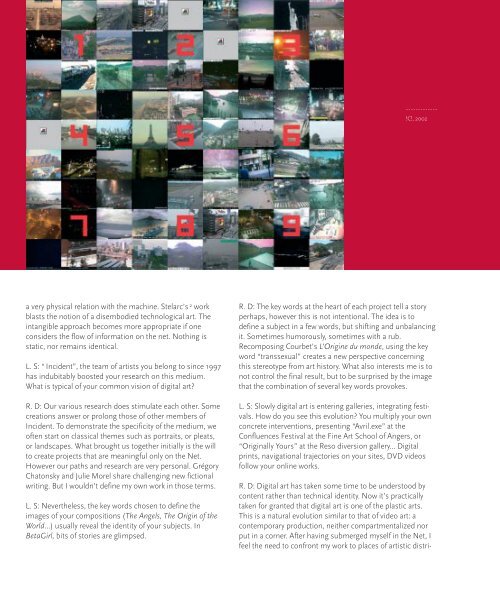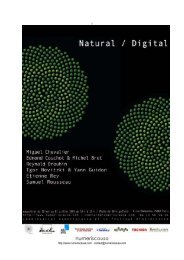Télécharger le pdf de la publication - Reynald Drouhin
Télécharger le pdf de la publication - Reynald Drouhin
Télécharger le pdf de la publication - Reynald Drouhin
Create successful ePaper yourself
Turn your PDF publications into a flip-book with our unique Google optimized e-Paper software.
a very physical re<strong>la</strong>tion with the machine. Ste<strong>la</strong>rc’s 2 work<br />
b<strong>la</strong>sts the notion of a disembodied technological art. The<br />
intangib<strong>le</strong> approach becomes more appropriate if one<br />
consi<strong>de</strong>rs the flow of information on the net. Nothing is<br />
static, nor remains i<strong>de</strong>ntical.<br />
L. S: “ Inci<strong>de</strong>nt”, the team of artists you belong to since 1997<br />
has indubitably boosted your research on this medium.<br />
What is typical of your common vision of digital art?<br />
R. D: Our various research does stimu<strong>la</strong>te each other. Some<br />
creations answer or prolong those of other members of<br />
Inci<strong>de</strong>nt. To <strong>de</strong>monstrate the specificity of the medium, we<br />
often start on c<strong>la</strong>ssical themes such as portraits, or p<strong>le</strong>ats,<br />
or <strong>la</strong>ndscapes. What brought us together initially is the will<br />
to create projects that are meaningful only on the Net.<br />
However our paths and research are very personal. Grégory<br />
Chatonsky and Julie Morel share chal<strong>le</strong>nging new fictional<br />
writing. But I wouldn’t <strong>de</strong>fine my own work in those terms.<br />
L. S: Neverthe<strong>le</strong>ss, the key words chosen to <strong>de</strong>fine the<br />
images of your compositions (The Angels, The Origin of the<br />
World...) usually reveal the i<strong>de</strong>ntity of your subjects. In<br />
BetaGirl, bits of stories are glimpsed.<br />
...................<br />
!C!, 2002<br />
R. D: The key words at the heart of each project tell a story<br />
perhaps, however this is not intentional. The i<strong>de</strong>a is to<br />
<strong>de</strong>fine a subject in a few words, but shifting and unba<strong>la</strong>ncing<br />
it. Sometimes humorously, sometimes with a rub.<br />
Recomposing Courbet’s L’Origine du mon<strong>de</strong>, using the key<br />
word “transsexual” creates a new perspective concerning<br />
this stereotype from art history. What also interests me is to<br />
not control the final result, but to be surprised by the image<br />
that the combination of several key words provokes.<br />
L. S: Slowly digital art is entering gal<strong>le</strong>ries, integrating festivals.<br />
How do you see this evolution? You multiply your own<br />
concrete interventions, presenting “Avril.exe” at the<br />
Confluences Festival at the Fine Art School of Angers, or<br />
“Originally Yours” at the Reso diversion gal<strong>le</strong>ry... Digital<br />
prints, navigational trajectories on your sites, DVD vi<strong>de</strong>os<br />
follow your online works.<br />
R. D: Digital art has taken some time to be un<strong>de</strong>rstood by<br />
content rather than technical i<strong>de</strong>ntity. Now it’s practically<br />
taken for granted that digital art is one of the p<strong>la</strong>stic arts.<br />
This is a natural evolution simi<strong>la</strong>r to that of vi<strong>de</strong>o art: a<br />
contemporary production, neither compartmentalized nor<br />
put in a corner. After having submerged myself in the Net, I<br />
feel the need to confront my work to p<strong>la</strong>ces of artistic distri-






